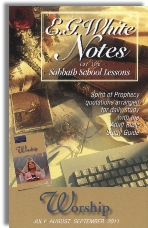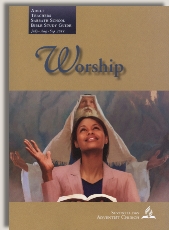|
||||||||||||||
Commentary on "Trust Not in Deceptive Words": The Prophets and Worship
Day 1: Sabbath Afternoon, August 20, 2011 - Introduction
Overview
This week, we will look at what a few prophets said about those who thought that their "worship" of the true God in the true temple on the true Sabbath day was all that mattered, regardless of how they lived the rest of the week. As the prophets show, this belief is a deception, a good way to "cook up all sorts of trouble for ourselves."
Observations
Perhaps the most fascinating part of reading Adventist literature is encountering words or expressions that seem like bolts of lighting out of a blue sky. It takes some time to figure out how these phrases fit with the rest of the story, but the struggle to understand the underlying connections make the reading less boring than usual! In this case, the word "true" relating to "sabbath" is the first confusing expression. It is preceded by the construction "true temple"—a phrase that is not unusual because in Old Testament times there were many false temples pertaining to pagan religions. What makes the expression "true Sabbath" unusual is the lack of "false sabbaths" with which the "true sabbath" should contrast in order to be parallel with the "true temple" reference—and in order to make sense.
The explanation for this misleading phrasing is found in the anachronistic reading of Adventist theology back into Old Testament history and Old Testament worship. The lesson assumes the reader will understand the scheme of "true-Saturday-Sabbath versus false-Sunday-Sabbath" when they encounter the "true Sabbath" phrase. For the Adventist, worship is more than recognizing God for who He truly is, thanking Him for His blessings, and praising Him for his grace. Worship on Saturday-Sabbath becomes the paramount issue that will seal people's salvation; this understanding is read back into the Old Testament account of worship.
That's the first key to untangling the confusion: anachronistic reading.
The second point of confusion is the word "matter". The reader is led to believe that what was wrong with Israel of old was that their orthodox style of worship, in the true temple on the true day, was "all that mattered", and "how they lived the rest of the week" didn't matter. It's true that their orthodoxy didn't match their orthopraxy, that Israel's worship was done by following the right rules which powerfully contrasted with their deliberate breaking of God's moral standards in everyday life. But coming to the conclusion that the error of the people rested in seeing their moral practices as being less important than liturgical practices is shallow.
The real problem wasn't an unbalanced scale of priorities; it was an unlawful, illegitimate use of the liturgy as a cover-up for their moral failures. Instead of repenting for both their daily sinful practices AND the sin of self-righteousness in their worship, Israel was proud of their apparent status as the "chosen people" and those favored by God. In order to cure them of this errant and sinful belief, God had to tear down the temple before the exile, and later, in the New Covenant era, to make the worship independent from holy space.
New Covenant implications
Speaking of the new covenant period that was coming, Jesus said to the women and Jacob's well near Samaria:
The hour is coming when neither on this mountain nor in Jerusalem will you worship the Father [...] But the hour is coming, and is now here, when the true worshipers will worship the Father in spirit and truth (John 4:21, 23).
The temple, the holy space, had to make room for universal worship in spirit and in truth. The universality of the message of the gospel to every tribe, nation, and language of this planet was incompatible with the Jewish regulation for holy space—worship had to be at the temple. With the new covenant inauguration of worship in spirit and truth instead of in holy places, the Jews could no longer hide behind their liturgical practices that they used illegitimately as a cover for their moral failures.
Paul warned that resurrecting the old covenant practices, festivals, new moons, and sabbaths (Col. 2:16) was a nostalgic rebuilding of the wall of separation that was torn down (Galatians 2:18; Ephesians 2:14,15). For these new Gentile believers, embracing the old covenant rituals was a reenactment of the Israel's liturgical sins.
It's no wonder that the lesson's author is trying to present the worship of the Old Testament Israel in a favorable manner, as being good although insufficient to rectify their moral failures. As the current lesson affirms, Israel had to give the same priority and importance to their moral life as to their worship rituals. If they did that, seemingly all would be well and they would not be culpable for their worship practices. The lesson misses the point that worship is not divisible from moral behavior.
The next lesson is a step further in endorsing this erroneous mindset.
Copyright 2011 BibleStudiesForAdventists.com. All rights reserved. Revised August 16, 2011. This website is published by Life Assurance Ministries, Glendale, Arizona, USA, the publisher of Proclamation! Magazine. Contact email: BibleStudiesForAdventists@gmail.com.
The Sabbath School Bible Study Guide and the corresponding E.G. White Notes are published by Pacific Press Publishing Association, which is owned and operated by the Seventh-day Adventist church. The current quarter's editions are pictured above.
Official Adventist Resources
Standard Edition Study Guide Week 9
Teacher's Edition Study Guide Week 9
Easy Reading Edition Study Guide Wk 9
Search the Complete Published Ellen G. White Writings
Please Support This Project


